April 22, 2010
The Culmination of a Long-ish Search
A while ago I made a rather un-grammatically-titled post on the subject of pretty books, which you can find here. In the year since then I’ve been visiting these artists’ websites religiously, waiting patiently for the volume destined to be mine. Almost one year to the day after my search began, it has ended.

Meet my new fancy-purse. The volume is, in case you can’t make out the spine, The Three Musketeers by Alexandre Dumas, under the imprint of the “International Collector’s Library”, from Doubleday. The original book was one of those cheap reprints designed to look good if you don’t look too closely; apparently the interiors were quite cheap. But no fear – the interiors here have been stripped and replaced with a vintage Liberty of London print.

Needless to say it will be accompanying me to all my fancy-dress parties from now on. I now owe a huge debt of gratitude (my huge financial debt being paid) to Caitlin Phillips at Rebound Designs for making me the coolest book nerd on the block.
April 19, 2010
Toronto’s Best-Kept Book Secret?
Despite a childhood lived almost exclusively within the walls of public libraries across the country, I have grown into a woman who really likes to own books. Erasmus supposedly said “When I get a little money I buy books; and if any is left I buy food and clothes.” – and if he didn’t say it, I will certainly take credit. Buying books is a great pleasure of mine.
So, of course, any[1] source of good, inexpensive books is a source I will haunt faithfully. One of the very best of these is the Sale Section at my home-away-from-home, the Bob Miller Book Room. I am not alone in this assertion – more than once I have run into local rare book dealers and book scouts scouring the section. These are people who Would Know. On the other hand, sometimes I think nobody knows except me and these few dealers.
The Bob Miller Book Room is hazily known to most English students at the University of Toronto and not many other people. Though it is not a university bookstore, it’s hidden location in the basement of a Bloor Street office building keeps it a virtual secret from anyone except those who have been sent there (i.e. the students) and those who are In The Know. We specialize in humanities and social sciences books with an unusually large stock of “academic” titles you won’t find elsewhere, which is wonderful in and of itself but what should make the store a beacon to book lovers everywhere is the sale books.
Unlike most bookstores, the Bob Miller Book Room has a sale section based on our regular stock, rather than on cheaply-acquired publisher’s overstock titles. As of this morning this amounts to eight jam-packed bookcases of assorted titles in no particular order all offered for 50-75% off the cover price. How the owners decide what gets tossed in this section is a mystery to me. The titles range from the canon to the obscure, from small presses to large ones, and often includes books which can also be found for full price elsewhere in the store. What’s not to love here?
New Canadian Library (NCL) titles were scattered all over both sections. I nearly cried when I found this: Margaret Ostenso’s Wild Geese for 75% off. That’s like $2.50! Where was this book when I was looking for it last month? Ah well, a prize for someone else to claim.
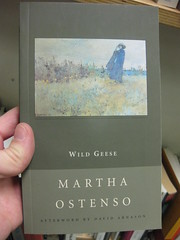
Small press titles abound, especially from Canadian presses, like Michael deBeyer’s Change in a Razor-backed Season from Gaspereau Press ($18.95-75% = $4.74)
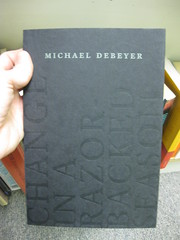
The Bob Miller Book Room specializes in scholarly works, so you can find weird things like these:
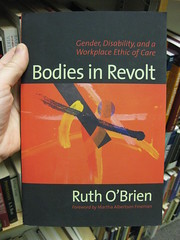

Or Nobel and Booker winners like these:
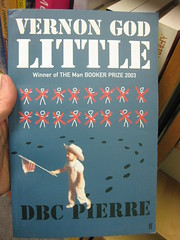
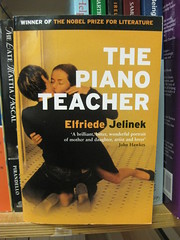
Or “One of Charlotte’s Favourite Books Ever” like this one:
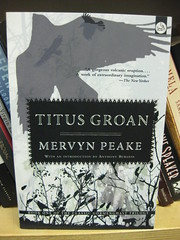
Needless to say I have gone nuts over the last month, blowing to smithereens my “read 5 off the shelf, buy 1 from the store” rule. Among my own buys? Alberto Manguel’s Library at Night, the new Penguin Classics translation of The Tain, Adrian John’s The Nature of the Book, Chinua Achebe’s Arrow of God, Salman Rushdie’s Ground Beneath Her Feet… and I’m gonna stop listing now because if my husband reads this and sees how many books I’ve smuggled into our already-overflowing bookshelves, he’ll plotz. Suffice to say I have nearly filled an entire shelf. But it was cheap! And what’s a little shelf space? This is, after all, what I live for.
The Bob Miller Book Room’s sale section remains in place year-round, until the books are all gone. And if you drop by, be sure to say hi to yours truly!
[1] Any ethical, let me say – you could not pay me to shop at certain used bookstore chains who almost certainly traffic to a large extent in stolen books.
April 15, 2010
The Ecology of Ideas: An Interview with Of Swallow’s Jason Rovito
The media’s narrative goes like this: Toronto booksellers are dropping like flies, with venerable institutions like Pages and David Mirvish Books on Art as well as newer enterprises like McNally Robinson and TYPE on the Danforth shutting their doors. But not to worry, new bookstores are cropping up all over town; plucky startups like ReReading, Good Egg and Zoinks! are going to try their luck in the strange new world of the internet, ebook and big box retail.
Into this narrative enter Of Swallows, their deeds, & the winter below. Jason Rovito has become Of Swallow’s figurehead, the latest young entrepreneur to try his hand at redefining bookselling for the 21st century. But Rovito’s vision of a center for knowledge exchange and an experiment in community idea building is a far cry from the usual bookseller line, and indeed neither the man nor the space fit into the usual roles of proprietor and property. Traditional and innovative booksellers alike are trying to sell a product; Of Swallows is going to try to become a location of intellectual exchange.
But jargony idealism aside, Rovito’s collective seems to have a sound foundation: the bookstore sells second-hand scholarly books while the location at 283 College Street (at Spadina) is also home to the Toronto New School of Writingand a 3rd floor office and boardroom are available for rent on an hourly basis to interested parties. This helps pay the bills but more importantly, drives like-minded users into the space. For Rovito, whose academic background includes work on urban Marxism and the history of the medieval university, locality, community, and exchange are completely the point of bookselling. “If you take care of the cultural ecology,” he told me, “the political economy takes care of itself.” That is to say, if you have a healthy community of eager minds converging on a place, books are bound to sell.
I was intrigued by Of Swallows right off the bat for a number of reasons: For starters, it is a used, not a new, bookstore. If the current economy can be said to be unfriendly to independent new booksellers, it is certainly even more so to used sellers who don’t have the benefit of publishers’ marketing budgets and distributors’ returns policies. Of Swallows’ intellectual predecessor, Atticus Books formerly of Harbord St., recently “went digital”, leaving behind the question of if a second-hand scholarly bookstore is economically viable. And how could anyone compete with Amazon’s used-book subsidiary, Abebooks.com?
Rovito’s answer to the potential pitfalls of bookselling seems to be to focus on the space of bookselling, not the books themselves, a refocusing he described as getting away from the “fetishization of the object” and moving towards a “life cycle of ideas” instead. And he’s quite right to do so. Bookselling, unlike other forms of retail, has traditionally been as much about the bookseller as about the product. Customers come to browse, relying on a particular seller’s taste in acquiring stock. They come for advice as well, for recommendations and discussions. Readers will frequently ask a seller, “Have you read this?” where a clothing shopper will not ask “Have you worn this?” There is, as Rovito points out, a “ritualistic aspect to bookselling” which recognizes that the act of going into a bookshop is something many people engage in without, necessarily, a thought about the commodity within. They’ve come for ideas, the possibility of knowing.
Of Swallows is situated barely a block from the University of Toronto’s St. George campus, a location not chosen by accident. In fact, Rovito had originally planned to move into a space even closer to the heart of the university, a stone’s throw from the monumental Robart’s Library. That his customer base would be taken from the academic community is obvious, but Rovito is not trying to become “a University bookstore”. Rovito, a university lecturer and PhD candidate, has spent enough time within the ivory towers to recognize that the university experience, for many, has become commodified, especially for undergraduates. It isn’t about learning or edification anymore as much as it is about gaining a degree which (in theory) will get you a better job. But amongst the hordes of accreditation-seekers are still those people who would have, in the 15th century, flocked to Oxford or Bologna for nothing more than a chance to read books and talk to their peers. Knowledge doesn’t have to be the product or sole property of the ivory tower, he reasons. For those people who want to learn, and to explore ideas, and make use of the minds of others, there must be an outlet.
But what will they sell? Though Rovito is prepared to let the demands of his customers shape the stock, he has some foundational ideas. Much of his initial stock has been acquired from Atticus from amongst their non-rare books. Rovito has an interesting (though, he admits, perhaps not viable) idea of a store divided by the medieval divisions of knowledge: the trivium (grammar, logic and rhetoric) and the quadrivium (arithmetic, geometry, music, and astronomy). More esoteric subjects already emerge from amongst the interests of Rovito himself and his early customer base, such as the “Metropolis” (think Georg Simmel and Fritz Lang rather than Jane Jacobs and Richard Florida). In my two-second walk through the space long before the doors were to open, I spied Latin Classics and continental Philosophy amongst the paint cans and new lighting fixtures. Not your usual bookstore fare, for sure.
Of Swallows is slated to open their doors to the public Thursday April 22nd 2010, at noon. I will certainly be there, and wish the best of luck to a great idea!
March 19, 2010
On Reviewing, and Reviews
The latest Quill & Quire (probably the best issue in years, and worth a read if you can find one) features an essay from Richard Bachmann, recently retired bookseller, in which he says the following:
“The other…concern is the disappearance of avenues to tell people about books. Superficially, it might seem that the new media have made available more channels of information than ever before. I don’t believe this is an advantage. Having a multitude of un-vetted book blogs is not quite the same thing as real discourse.”
He is lamenting, as most of us are, the death of newspaper book sections in particular, but more central, “legitimate” literary reviews in general. I agree with his sentiment and maybe even his statement.
There are a lot of book blogs out there. Even in the small sub-category of Canadian Book Blogs By Readers there are seemingly endless choices. It’s easy and fun to read and review books and most of us do it. But how does this add to the literary or publishing ecosystem? I am absolutely guilty of talking more than I listen – I write reviews as if anyone might care, but I actually tend not to read blogs which simply review books. Maybe this reflects my own interest, but I tend more towards blogs which provide “original content” in the form of essays and analysis rather than reviews or links elsewhere. Where I do read reviews, shamefully, it tends to be to compare that reader’s thoughts to my own on books I have already read, rather than to evaluate a book for potential future purchase.
It isn’t that I don’t read reviews elsewhere either. I am a fanatic reader of the TLS and frequently order books I have seen covered there. Why should a book blog review be any different?
But it is different. Bachmann is quite right – though a few comments to a blog post might constitute a very limited dialogue, this is nothing compared to the edifying and influential exchanges that occur through the TLS’s (or NYRB‘s) letters pages. There’s a certain feeling of witnessing cultural formation before your eyes that you get from a “legitimate” source that feels lacking in blogs. The conversation is too, to use Bachmann’s word, “diffuse”. While this allows for wider coverage, it also pulls the conversation apart into disparate, self-selecting pieces. Do writers Google themselves to see which blogs have reviewed them? Do they care? Would they respond to criticism? Will anyone defend or contradict them?
What do we provide here? I have a sneaking suspicion that the majority of my readers are either book bloggers themselves, or else publicists. We’re people on the production, rather than purchasing, end. Are we capable of reaching a wider public? Do we help? Publicists are certainly betting that we will – there’s a real upswing in promo copies going out to bloggers I’d reckon. Whether this is speculation on the publishers’ part or if they have data to confirm that our special form of word-of-mouth actually translates into sales, I don’t know.
A suspect there’s a benefit to our coverage of small releases, based on my own limited data. Publicists – take note! My review of Frank Newfeld’s Drawing on Type is one of my most-viewed reviews, and certainly one of the most searched reviews. That is to say, people search for “Frank Newfeld” or “Drawing on Type” and find my review. On the other hand, my review of Val Ross’s Robertson Davies: A Portrait in Mosaic has been viewed three times as many times, but almost never because someone was actually searching for “Val Ross”, “Robertson Davies” or anything that might actually suggest this book. So my review of Drawing on Type was probably more effective, from a publicity standpoint, than was my review of Robertson Davies. This is probably because very few “big” reviews were out there, and my limited contribution was all that could be found.
This does not, however, suggest that small press publishing benefits from the bloggosphere. We’re still talking about tiny numbers, and no conversation. My review, after all, was not especially flattering. Where’s the rebuttal? I have been debateably harmful to Porcupine’s Quills’s sales. This is not a healthy literary ecosystem.
But these are my limited numbers. Perhaps some of you have had different experiences? Do you read reviews online? Do they make a difference to you? Do we render a valuable service or a poor replacement?
March 17, 2010
The B-Team
It has just come to my attention that Oxford University Press is going to be outsourcing all of its independent bookstore distribution to H.B. Fenn & Co. An understandable maneuver, I suppose, but one which saddens me anyway, as I’ll explain below.
First, a little Bookselling 101 for those of you who’ve never been on the supply side of things. Books are sold, generally, along a publisher -> distributor -> bookstore chain. While many publishers often have their own distribution division (Random House, Penguin, Harper Collins, Simon & Schuster, etc.) this is generally a cost-saving measure provided by a big publisher who can afford to diversify like this. Smaller presses usually opt to have a bigger company do their distribution (Anansi, for example, is distributed by Harper Collins).
In the strictest technical sense distribution and publishing are two different businesses – one side creates and markets a book, while the other physically gets it into bookstores (and back again, if the case may be). In cases where the publisher is not owned by the distributor, there is generally some arrangement between them to ensure that the distributor gets a cut of the books they distribute. In some cases, this is an additional discount offered to the distributor and in others, the distributor limits the discount given to the bookseller. In any case, the distributor is another actor in the “book chain” who needs to be paid.
I don’t think it’s any coincidence that distributors who are also publishers tend to offer bookstores bigger discounts than than distributors who have to get their books from an out-of-house publisher. For a big publisher-distributor the cost of distribution is just a flat cost spread out over their entire publishing effort (which, in the case of a huge company like Random House, is a lot of books). Outside distribution on the other hand costs the publishers a bigger discount than if they can sell straight to a bookstore, or costs the bookstore more in the form of a smaller discount. The extra step is paid for by someone.
Oxford is a big enough publisher that they do generally handle their own distribution. They own a warehouse in Toronto and have books shipped here from the US or the UK or whatever they’ve been published. They will continue carrying these costs in the future because they are going to continue distributing to large customers. H.B. Fenn will, it seems, only be taking over their small accounts, which means all Oxford is saving is the man hours and shipping costs of a portion of their distribution. This is Disturbing News Part One. This means that Oxford thinks they will lose more m0ney on a dude packing up boxes, some cardboard and some CanPar shipments than they will lose by discounting all their independent Canadian sales to Fenn.
Oxford isn’t some tiny small press. Among other things, they sell dictionaries. Everyone carries dictionaries. By cutting distribution to small bookstores it looks to me as if they are saying they were making less money in a year selling dictionaries to every independent bookstore in the country than they were paying a guy to pack them up and ship them out.
Now, there’s another, more sinister option which is that Oxford isn’t going to be cutting Fenn an extra discount at all, and instead Fenn will be selling the books at a lesser discount to independents, which is terrifying. But I don’t think Oxford could get away with this and so I don’t think this is the case. Their discount isn’t fantastic to begin with, and Fenn generally has a decent discount on both their own and their distributed titles, so the idea that indies will suddenly have to pay another 8-10% on Oxford titles seems improbable.
No, what this means is that independent bookstores aren’t selling books, or, at least, aren’t selling Oxford books. This is annoying to me; I know many people who split their book shopping in arcane ways to justify a “supporting the little guy” stance while still getting those nice Chapters/Amazon discounts on big purchases. But if it’s going to encourage moves like this one, this is only a bad thing. Splitting “big” from “little” distribution won’t benefit bookstores at all. Because the outside distributor needs their cut the extra cost is more likely to be passed on to the store, a pressure the in-house distribution won’t feel. Not to mention other annoyances like the extra time it will take to process an order from a third party compared to ordering it from the source. As if the bookselling world isn’t a hazardous enough place for independents these days – two-tiered distribution like this is just another straw on the camel.
March 12, 2010
A Quick Aside:
You’re a bookish bunch, and I know at least one of you is Buried In Print – what do you do when you need to purge your library? Do you sell your books or give them away? To who do you give them, or sell them? Does it matter to you if they find good homes?
March 12, 2010
Canada Reads 2010 Wrap-Up
I’ve put the finishing touches on an order to Random House and with that, we here in bookseller land are prepared to administer Canada’s latest future bestseller (right? Right??!?) to an anxious public. It’s already all over Twitter, so I won’t pretend I’d be the one to spoil it for you: Nikolski has been crowned the winner of CBC’s Canada Reads 2010!
I guess I’d better pry my foot out of my mouth! I really didn’t see Nikolski pulling through but I am THRILLED about it! Michel Vezina, to whom this win is entirely owed, managed to turn my mind right around on this book and, apparently, did the same for the other panelists.
I have a theory about Canada Reads and why it will never really be truly disappointing:
By appointing a panel of pseudo-celebrities who are at least desirous of being of the intelligentsia you set up a situation where as much as anything, the panelists don’t want to be seen as populist, mainstream or ignorant. We saw this in the first two days: “Oprah” is a dirty word in this world where the panelists feel they are being called upon to provide literary guidance, to educate as much as to entertain. So a smart panelist who appeals to Greater Literary Values will shame, to some extent, these panelists out of voting against his or her title because they don’t want to be seen as pedestrian. A smart book defended by a not-especially-literate panelist may not make it, but a smart-enough book by a very literate panelist will. A smart book defended by a literate panelist is a guarantee. Knock on wood.
Back in the real world, will this translate into sales? Book of Negroes certainly did, but this was a book that was mounting momentum before it won. I remember Rockbound by Frank Day flying off the shelves. A Complicated Kindness by Miriam Toews was selling well before the Canada Reads nod. King Leary was a bit of a wiff at our store, but then it wasn’t a very good book (and I say this as a die-hard Paul Quarrington acolyte) as was Lullaby for Little Criminals for reasons I can’t quite put my finger on. My boss, who has been selling books for over 35 years, said the following when I told her who won: (and I quote)
“F. U. C. K. Who on earth is going to come crawling in looking for that?”
She had been rooting for Jade Peony, a tried and tested novel around these here parts that we thought would translate into reliable sales. Nikolski‘s an unknown quantity, I’ll be honest. A somewhat unconventional book, a translation at that, by an unknown first novelist. Those are qualities I find exciting, but I’m undecided as to what my fairly conservative clients will do. I’ll certainly let you know!
This has been fun, though. Thanks to everyone who blogged the debates this year: I read about six blogs a day and still managed to find something fresh and interesting voiced by each one. Enough discussion sparks my interest in even the dullest of books! We should do this again some time, maybe next year, same time?
ETA: Wayson Choy just walked into my store! I’d kill to know what’s going through his mind today. Must… be… discreet..
March 11, 2010
Canada Reads 2010: Day Four
I admit I didn’t see today’s elimination coming. I’m not thrilled about it – the book was going to go eventually, but now there’s no “easy off” vote for later in the eliminations.
In fact, it seems to me that today’s vote, in any case, is completely clear cut. Unless something magical happens it will almost certainly be death for Nikolski. Rolly & Michel will vote for Good to a Fault, while Samantha, Simi and Perdita will take out Nikolski. I don’t see who would deviate from that pattern right now, unless Perdita was feeling vengeful enough to lob another bomb at Jade Peony. Alas, Nikolski, you deserved better.
Today’s debates started to get a little more interesting, but I notice the questions tend towards terms like “resonate” and “relate to”. The name of the game this year seems to be finding the book which is the cuddliest, which does not bode well for a book which is experimental, edgy or technically masterful (or in this year’s case, experimental, quirky or technically competent). Perdita’s statement that she “doesn’t want to have to think” when she’s reading a novel was possibly the most horrifying thing I’ve ever heard on this show, but may in retrospect serve to explain why a book like Good to a Fault now seems to have a decent chance at winning.
I didn’t find the moralizing in Good to a Fault challenging or insightful at all. Clara, ultimately, took on three children who had nowhere else to go, something I think most women would do if they had the means. And Clara has the means – she is not, in any real way, put out by taking on these kids. She didn’t have to sacrifice anything and she was not made to suffer for her actions; it was, really, easy for her to do. Ma Pell was perhaps the only thorn in her side but painting her as an anti-social hermit effectively took her out from underfoot. Clayton, the character I thought was going to be the actual challenge for Clara to overcome, conveniently exits the scene before it begins. Darwin looks like a promising challenge for the half-page we think he’s a drunk, but once that case of mistaken identity is cleared up he mainly serves to remove the last adult challenge Clara might have had to contend with: Lorraine.
So we are left with a rich woman taking on three gifted and mysteriously well-behaved children at no particular cost to herself. We have a brief moment where she “loses” the children to Lorraine’s recovery; but no worries, her husband most likely abandons her in the end and this means, clearly, that Clara will be able to step in and support the single mother. Lorraine lobs some unfounded criticism at Clara about something to do with class or self-righteousness, but ultimately it doesn’t feel true because it’s hard to see anything classist about housing three children who have nowhere else to go.
Alright, so that’s what I think, but then, I am thinking and not just feeling. Oh – and on that note, Simi’s claim that it isn’t the church that supports Clara when she’s down was mind-boggling. Of course it was. It was Paul, mainly. You know, the preacher, Paul, from the church.
I really wish I’d liked one of this year’s books a little more because I feel that these updates are maybe a little on the negative side. I’m still putting my money on Jade Peony thought it isn’t out of any great love for the book: I just disliked it the least. It feels safe and appropriate, two things I don’t generally advocate rewarding. So I feel a little dirty there. Oh well – maybe tomorrow will bring great surprises, hey? Here’s hoping!
March 10, 2010
Canada Reads 2010: Day Three
So Generation X gets the boot. I wish this were more of a surprise, but it isn’t, for anyone. Moving on.
I have been watching the debates online in video-form for the last two days and I have to comment on this experience. Last year I listened to every broadcast faithfully at 11:30am sharp and never caught a glimpse of our panelists even once, and this was a WILDLY different experience. I liked all these people more before I could see them. Why is that? The silence on the radio was serene; now watching reactions and exasperated body language is painful. Poor Rolly, he seems like a very nice boy! And Simi – what is with those sweaters? On the other hand, how cool is Michel Vezina? I want that man’s shirts! And the wink he gave Jian yesterday when he added Fire-Breather to his resume – those two would make just the cutest dang couple, I sure hope they’re knocking boots on the side.
Another thing – who is the 6th person in their introductory montage of authors – is that Lazer Lederhendler? I don’t remember anyone making as big a fuss about Sheila Fischman last year.
If it seems like I’m avoiding the debates, it’s for good reason: the questions Jian lobbed today were insipid. They destroyed MINUTES of perfectly good air time with that awful “How Canadian” question again this year. Kudos for Simi for trying to wriggle out of it. It’s a preposterous question, as should have been evident from the minute Michel asked for Francophone content. As if a staunch French-Canadian and a 2nd Generation Indian from Surry are going to have the slightest agreement about what’s “Canadian”.
The poverty question was an interesting one, though trying to find class divisions in Nikolski seemed like a stretch to me. But the wording still drove me crazy: which book evoked class issues best? What if that wasn’t the point of the novel? It seemed like a raft designed to buoy Good to a Fault, which was the only book which was really about class.
Speaking of which, I didn’t really like Good to a Fault but I find Rolly’s continual arcane criticisms of it baffling. There’s a lot to critisize in that book, but “too general” or “not enough detail” or “bad grammar” weren’t among my complaints. Can we talk about preachy morality yet?
After sitting and watching 21 minutes of Canada Reads debate, my 20-month-old feels she deserves a read-through of The Monster at the end of this Book now, and I’m inclined to indulge her. I look forward to seeing what the rest of you thought! My predictions? Good to a Fault or Nikolski are in trouble. I wish I could say Fall was on its way out, but it seems to be getting too much love. We’ll see tomorrow!
